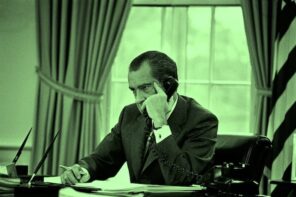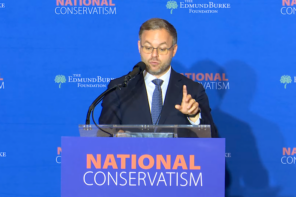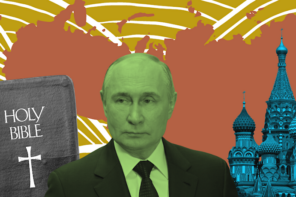That sound you hear is the deafening silence of American evangelicals on the plight of Jehovah’s Witnesses in Russia.
Just recently, police raids in Surgut and Lyantor rounded up 15 Jehovah’s Witnesses, who reported experiencing torture while in custody. At least seven Witnesses were stripped, beaten, suffocated, and subjected to electroshock in the anus.
The February 15 arrests followed the conviction of Dennis Christensen February 6 on charges of criminal extremism. Christensen, a Danish national who has been living and working in Russia as a carpenter, was arrested in 2017 and remained incarcerated for more than 600 days throughout his trial. Christensen’s only crime, according to the charge sheet, was unlocking the worship hall.
Russia’s record on religious freedom has grown increasingly abysmal, according to the United States Commission on International Religious Freedom. The nation’s 1997 religion law tends to favor the Russian Orthodox Church. A 2002 law designed to combat extremism has been used against unpopular religious groups, like the Jehovah’s Witnesses, while a law passed in 2012 requires nongovernmental organizations (like churches) to register as “foreign agents” if they receive support from abroad. A blasphemy law passed in 2013 criminalizes offenses to religious sentiments. And the 2016 “Yarovaya Law” forbids “preaching, praying, disseminating religious materials, and even answering questions about religion outside of officially designated sites.”
It would take pressure from faith communities in the United States on the Trump Administration to halt the mounting repression of minority religions in Russia—much as American Jews raised awareness of the plight of Soviet Jews in the 1970s. That pressure is unlikely to emerge, however, at least not from the Religious Right and its allies among some evangelical Christians.
These Christians actually admire Vladimir Putin. Franklin Graham praised both Putin and Russia’s 2013 law banning “gay propaganda,” which prohibits equating straight and gay relationships. Right-wing columnist Patrick Buchanan observed that “In the culture war for the future of mankind, Putin is planting Russia’s flag firmly on the side of traditional Christianity.” He concluded his column by asking “In the new ideological Cold War, whose side is God on now?”
Thus far Muslims have been the primary targets of religious repression, especially in the restless republics of the northern Caucasus, where the USCIRF describes the situation in Dagestan and Chechnya as “legalized terror.” A campaign against Crimean Tatars marks the Russian occupation of Ukraine.
But Jehovah’s Witnesses now seem especially beleaguered. Designated an extremist organization in 2017 and prohibited from practicing their religion, the 170,000 Witnesses in Russia have suffered beatings, arrests, detention, incarceration, and now torture.
It seems like American Christians might be alarmed to learn that the nation they hold in regard is confiscating Bibles, criminalizing evangelization, and torturing believers. They certainly were during the Cold War, when Franklin’s father Billy Graham, Carl F. H. Henry—founding editor of Christianity Today—and others harshly criticized religious repression in the Soviet Union.
Yet Christianity Today has largely been silent on the subject of abuses in Russia and recently named Uzbekistan a poster child for religious freedom. An article describing the 2017 ban on the Witnesses provided theological reasons for evangelicals to “oppose” them, noting the group’s denial of the Trinity and the divinity of Jesus.
At least the USCIRF is acting on the persecution of Jehovah’s Witnesses, Muslims, and other religious groups, including Scientologists. For the last two years the bipartisan commission has recommended that the U.S. State Department designate Russia a “Country of Particular Concern” (CPC). Being named a CPC could have diplomatic or economic consequences above and beyond the “naming and shaming” that the designation carries.
The State Department adopted ten of the USCIRF’s sixteen recommendations for CPCs in 2018, which included countries like Iran, China, North Korea, and Pakistan. But Secretary of State Mike Pompeo placed Russia and Uzbekistan on a “Special Watch List,” rather than identifying them as CPCs.
Even without the CPC designation, Russian officials could face financial consequences under the Magnitsky Act. Passed by the U.S. Congress in 2012, the act calls for sanctioning Russian officials responsible for “gross human rights violations.” In the wake of its passage, Russia suspended foreign adoptions by Americans. (So when Jared Kushner and Donald Trump Jr. said they were only talking about adoptions with Russian lawyer Natalia Veselnitskaya in their June 2016 meeting in Trump Tower, they were telling the truth, sort of, since they were discussing repercussions of the Magnitsky Act.) Under the act, dozens of Russian officials involved in documented abuses have been sanctioned.
In 2016 Congress extended the act to encompass any country engaged in human rights violations. Under the Global Magnitsky Act, Secretary of State Pompeo recently named 17 individuals from Saudi Arabia implicated in the murder of journalist Jamal Khashoggi. This means any assets or business interests they have in the United States may be frozen. The Global Magnitsky Act could be invoked to sanction Stepan Tkach, Dmitry Asmolov and Sergey Bogodelov, the investigators and torturers working for the Investigative Committee of Russia who mistreated the Witnesses—if there were the political will to do so.
Jerry Falwell Jr. is one of the few prominent evangelicals to denounce the persecution of religious minorities in Russia. And the National Religious Broadcasters did condemn the Yarovaya Law, which restricts proselytizing.
But it appears that many American evangelicals are wrapped up in narratives of their own persecution—like having to use a unisex bathroom or being forced to bake a cake for a gay couple. They seem to agree with evangelist Rick Joyner, when he claimed that “There is much more freedom of religion in Russia than there is in America.”
They might want to talk to some Jehovah’s Witnesses about that the next time they’re standing on the doorstep presenting a copy of The Watchtower. That’s been banned in Russia as well.




